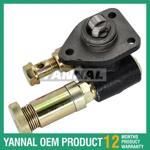Information injection-pump assembly
BOSCH
9 400 614 438
9400614438
ZEXEL
101492-3450
1014923450
KOMATSU
6204711410
6204711410
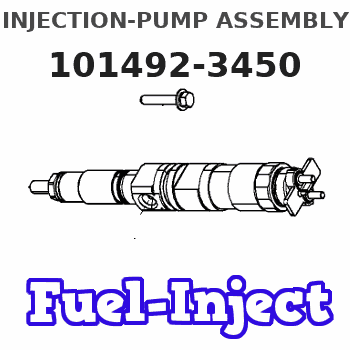
Rating:
Service parts 101492-3450 INJECTION-PUMP ASSEMBLY:
1.
_
5.
AUTOM. ADVANCE MECHANIS
6.
COUPLING PLATE
7.
COUPLING PLATE
8.
_
9.
_
11.
Nozzle and Holder
6207-11-3102
12.
Open Pre:MPa(Kqf/cm2)
19.6{200}
15.
NOZZLE SET
Cross reference number
BOSCH
9 400 614 438
9400614438
ZEXEL
101492-3450
1014923450
KOMATSU
6204711410
6204711410
Zexel num
Bosch num
Firm num
Name
Calibration Data:
Adjustment conditions
Test oil
1404 Test oil ISO4113 or {SAEJ967d}
1404 Test oil ISO4113 or {SAEJ967d}
Test oil temperature
degC
40
40
45
Nozzle and nozzle holder
105780-8140
Bosch type code
EF8511/9A
Nozzle
105780-0000
Bosch type code
DN12SD12T
Nozzle holder
105780-2080
Bosch type code
EF8511/9
Opening pressure
MPa
17.2
Opening pressure
kgf/cm2
175
Injection pipe
Outer diameter - inner diameter - length (mm) mm 6-2-600
Outer diameter - inner diameter - length (mm) mm 6-2-600
Tester oil delivery pressure
kPa
157
157
157
Tester oil delivery pressure
kgf/cm2
1.6
1.6
1.6
Direction of rotation (viewed from drive side)
Right R
Right R
Injection timing adjustment
Direction of rotation (viewed from drive side)
Right R
Right R
Injection order
1-2-4-3
Pre-stroke
mm
3.6
3.55
3.65
Beginning of injection position
Drive side NO.1
Drive side NO.1
Difference between angles 1
Cyl.1-2 deg. 90 89.5 90.5
Cyl.1-2 deg. 90 89.5 90.5
Difference between angles 2
Cal 1-4 deg. 180 179.5 180.5
Cal 1-4 deg. 180 179.5 180.5
Difference between angles 3
Cal 1-3 deg. 270 269.5 270.5
Cal 1-3 deg. 270 269.5 270.5
Injection quantity adjustment
Adjusting point
A
Rack position
9.6
Pump speed
r/min
850
850
850
Average injection quantity
mm3/st.
36.5
35.5
37.5
Max. variation between cylinders
%
0
-2.5
2.5
Basic
*
Fixing the lever
*
Injection quantity adjustment_02
Adjusting point
-
Rack position
8.2+-0.5
Pump speed
r/min
375
375
375
Average injection quantity
mm3/st.
6.2
5.2
7.2
Max. variation between cylinders
%
0
-15
15
Fixing the rack
*
Remarks
Adjust only variation between cylinders; adjust governor according to governor specifications.
Adjust only variation between cylinders; adjust governor according to governor specifications.
Test data Ex:
Governor adjustment
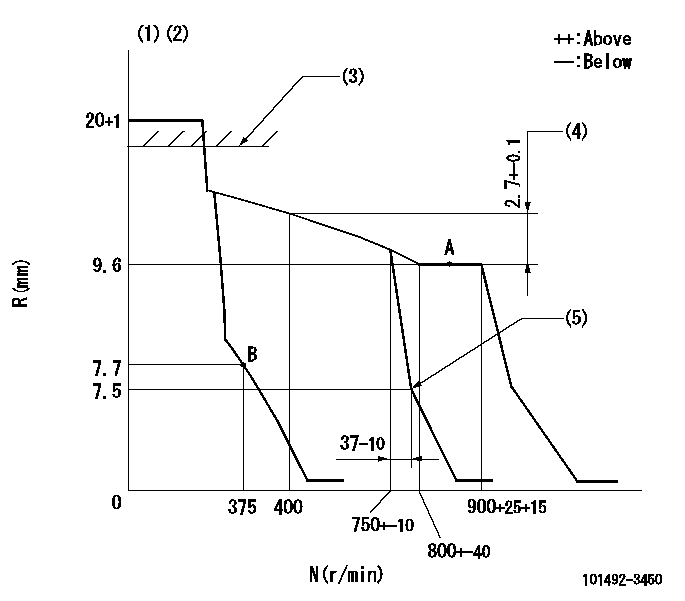
N:Pump speed
R:Rack position (mm)
(1)Target notch: K
(2)The torque control spring must does not have a set force.
(3)RACK CAP: R1
(4)Rack difference between N = N1 and N = N2
(5)Idle sub spring setting: L1.
----------
K=12++ R1=(17.5)mm N1=850r/min N2=400r/min L1=7.5-0.5mm
----------
----------
K=12++ R1=(17.5)mm N1=850r/min N2=400r/min L1=7.5-0.5mm
----------
Speed control lever angle
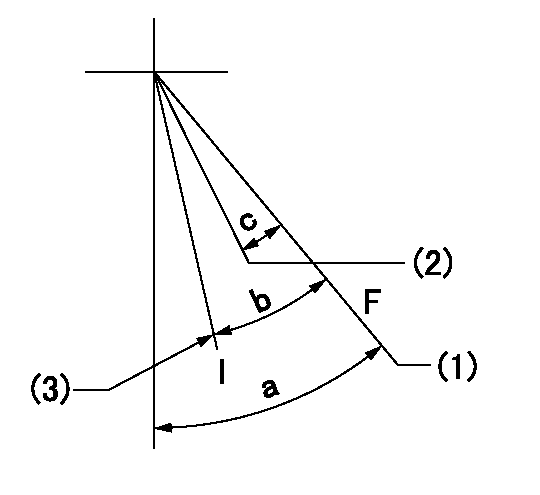
F:Full speed
I:Idle
(1)Set the pump speed at aa. ( At delivery )
(2)Pump speed = bb
(3)Stopper bolt setting
----------
aa=900r/min bb=750r/min
----------
a=(54deg)+-5deg b=(22deg)+-5deg c=(6deg)+-5deg
----------
aa=900r/min bb=750r/min
----------
a=(54deg)+-5deg b=(22deg)+-5deg c=(6deg)+-5deg
Stop lever angle
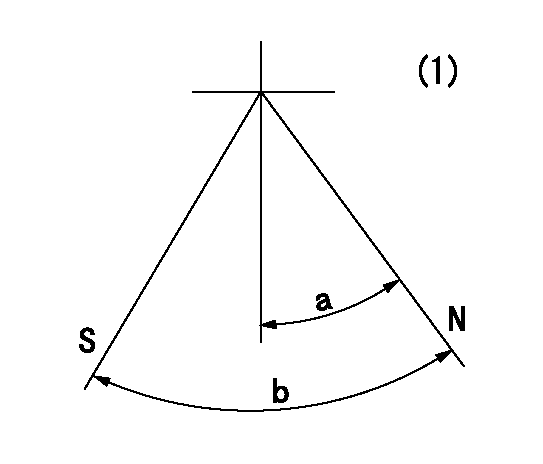
N:Pump normal
S:Stop the pump.
(1)No return spring
----------
----------
a=47deg+-5deg b=53deg+-5deg
----------
----------
a=47deg+-5deg b=53deg+-5deg
Timing setting
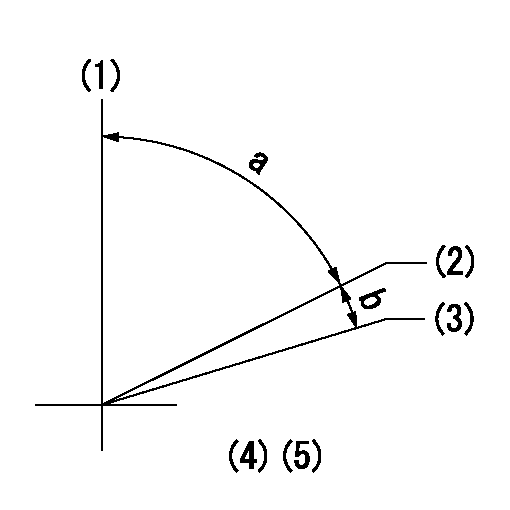
(1)Pump vertical direction
(2)Position of key groove at No 1 cylinder's beginning of injection
(3)Stamp aligning marks on the pump housing flange.
(4)-
----------
----------
a=59deg36min+-3deg b=0deg24min+-30min
----------
----------
a=59deg36min+-3deg b=0deg24min+-30min
Information:
Start By:a. remove flywheel
The crankshaft rear seal and wear sleeve must both be removed because they must be replaced as a new set. The new seal set must not be separated.
1. Use a sharp punch and a hammer to put four equally spaced holes in seal (1).2. Install the tip of Tool (A) into the seal, and use the slide hammer to pull it out of the flywheel housing. Change the location of Tool (A) in the seal in order to pull the seal out evenly. 3. Install two 5/8 "-18 NF × 4 in. (102 mm) long bolts (2) to hold the crankshaft rear gear in position.4. Install 5P-7314 Distorter Ring (3) [part of Tooling (B)] in the space where the seal was removed.
Be careful not to damage the crankshaft rear gear.
5. Use 5P-7312 Distorter Ring (4) [part of Tooling (B)] to distort the wear sleeve. Put the end of the distorter in the space where the seal was removed.6. Turn the distorter to cause distortion to the wear sleeve. Move the distorter to another position, and turn the distorter again. Do this procedure until the wear sleeve is loose on the crankshaft.7. Remove the distorter, distorter ring and wear sleeve.Install Crankshaft Rear Seal & Wear Sleeve
The front and rear seals and wear sleeves have different spiral grooves in the seal. Because of this type of design, the front seal group for an engine is different from the rear seal group. If a seal group is installed on the wrong end of the engine, oil can actually be taken out of the engine instead of moving the oil back into the engine.
1. Fasten Tooling (A) to the crankshaft rear gear.2. Use 6V-1541 Quick Cure Primer to clean the outside diameter of the crankshaft rear gear and inside diameter of the wear sleeve in seal assembly (1).3. Put 9S-3265 Retaining Compound on the outside diameter of the crankshaft rear gear and the inside diameter of the wear sleeve in seal assembly (1).
Do not separate the lip-type seal from the wear sleeve. The material in the large lip of the seal can be damaged easily. A scratch or rub (not visible) from a finger can damage the seal enough that it cannot be used. Install the sleeve in the seal. Once there is separation of the sleeve and lip-type seal they cannot be used again and must be replaced with a new seal group. Do not use any type of lubrication during installation of the seal group. If any type of lubrication is used in the installation of the seal group, early seal failure can result.
4. Put seal group (1) in position on Tooling (A). Be sure direction arrows on the seal are the same as crankshaft rotation. 5. Put clean engine oil on the face of washer on nut (2) [part of Tooling (B)] that contacts the installer.6. Install Tooling (B) onto Tooling (A), and install nut (2) [part of Tooling (B)] on the threaded shaft of Tooling
The crankshaft rear seal and wear sleeve must both be removed because they must be replaced as a new set. The new seal set must not be separated.
1. Use a sharp punch and a hammer to put four equally spaced holes in seal (1).2. Install the tip of Tool (A) into the seal, and use the slide hammer to pull it out of the flywheel housing. Change the location of Tool (A) in the seal in order to pull the seal out evenly. 3. Install two 5/8 "-18 NF × 4 in. (102 mm) long bolts (2) to hold the crankshaft rear gear in position.4. Install 5P-7314 Distorter Ring (3) [part of Tooling (B)] in the space where the seal was removed.
Be careful not to damage the crankshaft rear gear.
5. Use 5P-7312 Distorter Ring (4) [part of Tooling (B)] to distort the wear sleeve. Put the end of the distorter in the space where the seal was removed.6. Turn the distorter to cause distortion to the wear sleeve. Move the distorter to another position, and turn the distorter again. Do this procedure until the wear sleeve is loose on the crankshaft.7. Remove the distorter, distorter ring and wear sleeve.Install Crankshaft Rear Seal & Wear Sleeve
The front and rear seals and wear sleeves have different spiral grooves in the seal. Because of this type of design, the front seal group for an engine is different from the rear seal group. If a seal group is installed on the wrong end of the engine, oil can actually be taken out of the engine instead of moving the oil back into the engine.
1. Fasten Tooling (A) to the crankshaft rear gear.2. Use 6V-1541 Quick Cure Primer to clean the outside diameter of the crankshaft rear gear and inside diameter of the wear sleeve in seal assembly (1).3. Put 9S-3265 Retaining Compound on the outside diameter of the crankshaft rear gear and the inside diameter of the wear sleeve in seal assembly (1).
Do not separate the lip-type seal from the wear sleeve. The material in the large lip of the seal can be damaged easily. A scratch or rub (not visible) from a finger can damage the seal enough that it cannot be used. Install the sleeve in the seal. Once there is separation of the sleeve and lip-type seal they cannot be used again and must be replaced with a new seal group. Do not use any type of lubrication during installation of the seal group. If any type of lubrication is used in the installation of the seal group, early seal failure can result.
4. Put seal group (1) in position on Tooling (A). Be sure direction arrows on the seal are the same as crankshaft rotation. 5. Put clean engine oil on the face of washer on nut (2) [part of Tooling (B)] that contacts the installer.6. Install Tooling (B) onto Tooling (A), and install nut (2) [part of Tooling (B)] on the threaded shaft of Tooling
